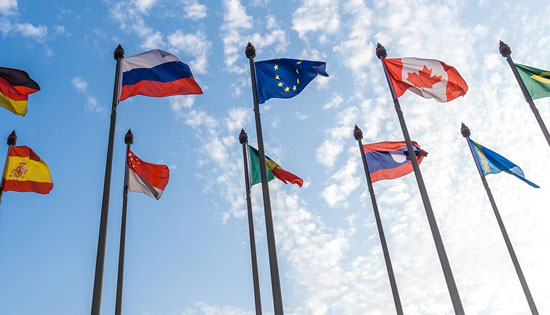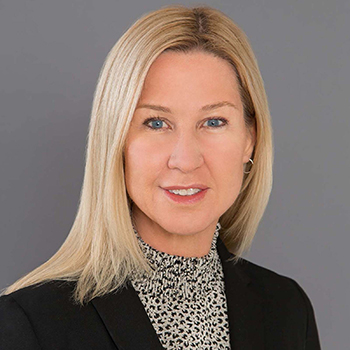Search for academic programs, residence, tours and events and more.
The world faces increasingly complex problems that have taken on global significance, including conflict and peace building, humanitarian crises and intervention, international economic inequality and instability, and global environmental change. Students in the PhD program understand the issues facing humanity and will develop both the research and leadership skills to examine how these problems are addressed at the global level. And are the mechanisms adopted to address them effective and just?
The PhD in Global Governance, offered jointly by Laurier and the University of Waterloo at the Balsillie School of International Affairs, is a unique opportunity for examination of power and authority in the global arena. Our graduates will pursue careers as researchers, scholars or practitioners working domestically or internationally in private sector positions, national or local governments, not-for profit agencies, think tanks and the media.

Graduate students in the program examine the variety of actors, institutions, ideas, rules, and processes that contribute to the management of global society. In addition to international organizations and inter-state relations, the study of global governance examines the various non-state actors as well as the realities of contemporary life that contribute to the establishment and functioning of global rules, norms and institutions.
The Global Governance PhD program interrogates the concepts, tools, and assumptions that have served scholars in the past and assesses new approaches for addressing contemporary and future challenges.
For further information, refer to the Graduate Handbook: Joint Laurier-UW Global Governance PhD Program.
PhD students will also complete the following milestones. The expected time to completion of the PhD is four years.
Normally, candidates must write comprehensive examinations in two areas within 16 months of starting the program. Normally, students will write comprehensive exams in September at the start of their second year.
The first examination will be on Global Governance and will test the breadth and depth of a student’s comprehension of the leading literature. For their second examination, students will choose to write a comprehensive examination in one of the six fields of the program.
Students can only write an examination in a field if they have completed two courses, one of which must be a “core course” in that field.
Normally, students will complete and have approved a doctoral dissertation proposal by the end of February of their second year in the program. Completion of the proposal will normally involve a formal presentation and defence of the proposal to the Supervisory Committee. Normally, committee members and the student will also complete their second Annual Progress Report following the defence/approval of the dissertation proposal.
Within one week after completion of the presentation and defence, the student will make any final changes to the proposal that arise from the defence and provide the respective Program Director or Associate Director as well as the respective Program Graduate Coordinator/Program Officer with a copy of the final proposal for their records and the student’s file.
Normally, the doctoral dissertation research proposal will be no more than 30 pages or approximately 15,000 words, exclusive of bibliography. A proposal will include the following: a statement of the principal research question(s) and a justification of the question or questions; an outline of the principal theoretical orientations that are framing the research questions; a detailed outline of the research methods and steps to be taken to obtain answers to the research questions; an assessment of the likely contribution to knowledge of the dissertation research; a timetable for completion of the research.
Laurier students are required to complete the Dissertation Proposal Approval form.
Doctoral theses can take various forms. The traditional thesis is a sole-authored document with various chapters. However, some theses – the multiple manuscript thesis – consist of a collection of papers that are published or submitted for publication; any such thesis must comply with the following guidelines:
Students will choose to specialize in one of the six fields in the program. To prepare for the comprehensive exam in that field, they must select at least two courses from their chosen field. Of these two, at least one course must be a course identified as “core” for that field.
This field is concerned with the referent objects of security and associated threats; the causes and management of conflict; and the global governance challenges of human, state, societal, national, international, ecospheric, and global security.
Courses in this stream examine the theory and practice of security at all levels of analysis.
This field is concerned with the global governance of environmental issues. Courses in this stream examine contemporary dilemmas relating to the ways in which environmental challenges are being addressed and managed by multiple agents through a range of transnational institutions and governance structures, both existing and proposed. Conceptual issues and debates, set within the context of a variety of internationally significant sustainability challenges, are investigated. Multilevel governance of these challenges at the international, regional, national and local levels are examined.
Key topics covered include: global climate change, agriculture and food security, international water resource management and environmental aspects of the global economy.
This field is concerned with the study of the relationship between global governance and issues of global justice and human rights.
Courses in this stream explore themes such as: the practical and ethical challenges that international human rights and relief organizations encounter when operating in the global south; theoretical approaches to understanding global justice as a contemporary social justice issue, with a particular focus on the cultural constructs relating to conceptions of freedom, obligation, and community; and contemporary debates in the field of human rights, such as those related to cultural relativism and universal human rights, human rights and foreign policy, the place of economic rights, the relationship between gender and human rights, and human rights and retrospective justice.
This field is concerned with the governance of the global economy and contemporary issues in international economic relations. Courses in this stream focus on the theoretical and public policy debates relating to governance of the global economy, as well as the evolution of international trade policy.
Topics covered include: international finance and intellectual property rights; labour and environmental standards; the control of illicit economic activity; the removal of tariffs on goods and services; and current efforts to integrate services, investment, and intellectual property into the trading regime through the increasing overlap of trade policy with monetary, competition, cultural, environmental and labour policies.
This field examines the prospects for the supranational governance of social issues with a particular focus on the political and philosophical underpinnings of transnational social policy cooperation.
Topics covered include: the implicit and explicit prescriptions for and impact upon national social policy of intergovernmental organisations (such as the UN and Bretton Woods Institutions), international non-governmental organisations and international private actors (such as TNCs and consultancy companies); the contribution of supranational organisations, international NGOs and other global actors to the global discourse on social policy; the role of private actors and global public-private partnerships in global health policy; the development of systems of transnational social redistribution, social regulation and social provision and empowerment; and the methods and concepts used by development agencies to assess the social policy of countries and shape their interventions.
This field is concerned with the formal and informal practices, institutions and organizations which generate global governance.
Courses in this stream focus primarily on the theory, practice and machinery of international organization, public policy, and diplomacy. Topics covered include organization theory, multilateral co-operation, foreign policy, diplomatic history, global social and public policy, representation and negotiation.
All students will complete six courses, including the following four mandatory courses: the global governance core course, an economics component, the history component, and Research Methods. Students are required to maintain an overall average of 80% in the course phase.
See a full list of all PhD in Global Governance courses.

"I see the Balsillie School as a unique institution that provides students and scholars with the academic and experiential foundations to lead Canadian and international organizations in pursuing the most effective paths to global security and harmony."
Ann Fitz-Gerald, director, Balsillie School of International Affairs
Take the first step in your graduate education and apply to one of our graduate programs. Follow our three-step admission process — we’ll walk you through how to apply and prepare for your first day as a graduate student.
Note: It is a requirement of the application process, that you contact a prospective faculty member who shares your interests and would be a supervisor "in principle" for your PhD, should you receive an offer of admission. This must be done in advance and the information must be included on the Application Summary of the online application.
The idea of "in principle" means a professor has reviewed your statement of intent and your CV, and agrees "in principle" to supervise your doctoral dissertation. Sometimes, after the successful acceptance of an offer, another professor may be deemed to be more a suitable advisor; on the basis of this determination, it is possible to change supervisors in the early stages of your PhD program.
After you have submitted your OUAC application, paid the non-refundable application fee, and Laurier has received your application, you'll receive an email from gradadmissions@wlu.ca advising you to upload the additional required documentation to Laurier’s Online Registration and Information System (LORIS).
The application process and the uploading of supplemental documentation, which includes references, typically takes two weeks. To avoid disappointment, please apply early.
An application for admission to our PhD program in Global Governance must include:
Visit our Graduate Admissions Toolkit for more information about applying.
Proficiency in written and spoken English is essential to graduate studies at Laurier. Applicants whose language of instruction during their previous postsecondary education was not in English must submit evidence of proficiency in English. If applicable, results from accepted testing services must be uploaded to LORIS.
Questions? Contact Maureen Ferraro, program officer, at mferraro@wlu.ca or 226.772.3122.
“The BSIA is a strong and supportive community in which I thrived as a student. I benefitted from the mentorship of a multidisciplinary faculty, exchanges with a diverse group of students, and comprehensive support that allowed me to network easily. I chose this program for its research and policy emphasis, and I made the right choice”
Ousmane Aly Diallo (PhD '2020)
Researcher, Francophone West Africa, Amnesty International
Regardless of the type of graduate degree program you intend to pursue, financial planning is important. At Laurier, we want to provide you with as much information as possible about a variety of scholarship and funding opportunities and equip you with the skills to manage your finances effectively in the years to come.
Laurier welcomes international applicants to all of our doctoral programs. International students who have confirmed funding from a third-party, such as their employer or a scholarship program in their home country, will be considered for admission. Learn more about admission requirements for international applicants.

The program is committed to providing students with the interdisciplinary skills for a wide range of careers in the field of global governance.
We provide the students with opportunities to gain relevant international work experience, whether as a visiting scholar at a top-ranked university or as a fellow at a leading think tank. In addition to the academic curriculum, we offer supplementary "professionalization" programming and are normally able to offer funds to support field research and travel to academic conferences.
Graduates of the Joint-PhD Program in Global Governance have gone on to tenure-track positions at a number of universities in Canada and abroad. Many others are pursuing a career in leadership positions for the Government of Canada, non-government agencies, think tanks or the private sector.
ASPIRE is Laurier's professional skills development training program for graduate students. The program helps you craft an individualized, extracurricular learning plan tailored to your professional journey and entry to the workplace.
Learn about the interests of our faculty members. If you are looking for more information about this program, have questions, or want to set up a meeting, contact a member of our team.
Alison Blay-Palmer
Professor
UNESCO Chair on Food, Biodiversity and Sustainability Studies
Winnie Chan
Instructor
Simon Dalby
Professor (Retired)
Timothy Donais
Associate Professor
Alistair Edgar
Associate Professor
Associate Dean, School of International Policy and Governance
Nick Garside
Instructor
Patricia Goff
Associate Professor
Jeff Grischow
Associate Professor
Derek Hall
Associate Professor
Jenna Hennebry
Associate Professor
Ken Jackson
Associate Professor
Jurek Konieczny
Professor
Alex Latta
Associate Professor
Terrence Levesque
Professor (Retired)
Colleen Loomis
Associate Professor
Sara Matthews
Associate Professor
Audra Mitchell
Professor
Canada Research Chair in Global Political Ecology
Kim Rygiel
Associate Professor
Co-Director, International Migration Research Centre
Pierre Siklos
Professor (Retired)
Debora VanNijnatten
Associate Professor
Alan Whiteside
Professor (Retired)
Randall Wigle
Professor Emeritus
Stacey Wilson-Forsberg
Associate Professor
Co-Director, PhD in Global Governance
Director, Master of International Public Policy
Carrie Wright
Instructor
Think this is the perfect program to continue your education?